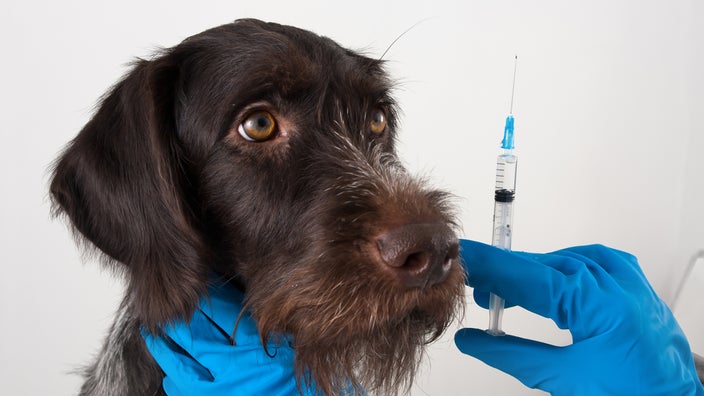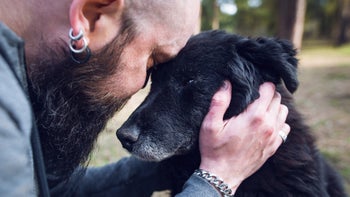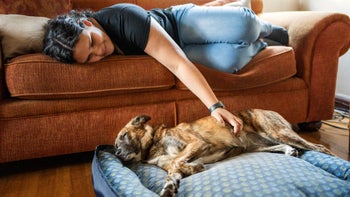
Lepto Vaccine for Dogs: Why Your Pup Needs This Core Vaccination
Key takeaways:
The leptospirosis vaccine is an annual immunization that can effectively prevent the disease in dogs. The lepto vaccine is recommended for all dogs.
Leptospirosis is a disease caused by Leptospira bacteria. The bacteria is often found in soil and water, mainly in puddles, streams, lakes, and rivers.
Dogs are at risk of getting infected during playtime and interactions with other animals, including domestic, farm, and wild animals.
Table of contents

It’s fun to watch your playful pup frolic in the backyard or at the dog park. But is your dog protected against leptospirosis, a disease caused by bacteria that can be carried by other animals who run through your dog’s play space?
This disease can be prevented by the leptospirosis vaccination, often referred to as the lepto vaccine. It’s now a core vaccine for dogs, so there are plenty of reasons to strongly consider getting your dog vaccinated.
What is lepto vaccination for dogs?
The lepto vaccine provides protection against leptospirosis disease in dogs. Leptospirosis is caused by Leptospira bacteria, which is spread by infected urine. The bacteria is often found in soil, water, and food. Leptospirosis can infect both humans and animals, although animal-to-human infection is less common.
Save on the top 10 pet medications
Save big on common pet medications like Fluoxetine and Levetiracetam at your local pharmacy.

GoodRx is NOT insurance. GoodRx Health information and resources are reviewed by our editorial staff with medical and healthcare policy and pricing experience. See our editorial policy for more detail. We also provide access to services offered by GoodRx and our partners when we think these services might be useful to our visitors. We may receive compensation when a user decides to leverage these services, but making them available does not influence the medical content our editorial staff provides.
Leptospirosis can cause serious symptoms in dogs, such as:
Stomach pain
Muscle pain
Stiffness
Severe weakness
If left untreated, leptospirosis can cause more serious — sometimes life-threatening — issues, such as:
Kidney failure
Bleeding disorders
Hepatitis
Eye inflammation
When the disease is caught early and treated with antibiotics, the chances of recovery from leptospirosis are high. But the lepto vaccine can protect your dog from getting and spreading the disease in the first place.
Is the lepto vaccine necessary for dogs?
Yes, the lepto vaccine is considered a core vaccine by the American Animal Hospital Association (AAHA). Core vaccines are recommended for all dogs. AAHA added the leptospirosis vaccine to the core vaccine list for dogs in 2024.
The lepto vaccine “will help to keep your dog from getting sick, along with preventing the spread of leptospirosis to other dogs,” Amber Karwacki, DVM, a veterinarian at Heart + Paw in Philadelphia, told GoodRx Health.
Read more like this
Explore these related articles, suggested for readers like you.
Dogs can be infected anywhere a domestic, wild, or farm animal carrying Leptospira bacteria might be. So the lepto vaccine protects all dogs, especially those who who:
Interact often with other dogs who may be carrying Leptospira
May drink from ponds, lakes, rivers, or streams
Live in a rural area or on a property with farm animals
Have access to a backyard where wild animals — such as raccoons, opossums, skunks, squirrels, and deer — roam
May come into contact with rodents like mice or rats
Quiz: What vaccines do dogs need?
How does the leptospirosis vaccine work?
The lepto vaccine works because it contains an inactive form of the bacteria that causes leptospirosis Karwacki said. This causes your dog’s immune system to form antibodies against the bacteria. Antibodies help your dog’s immune system fight off the disease. But the lepto vaccine itself does not infect your dog with the disease.
The first time your dog gets the leptospirosis vaccine, they will need two shots. Your vet will give your dog the second shot 2 to 4 weeks after their initial dose. Dogs should get the lepto vaccine starting at 12 weeks old. After their initial series of vaccines, your dog will need a lepto booster every year.
The current lepto vaccine only protects against a few types of Leptospira bacteria. But it still decreases your dog’s overall risk of becoming ill with leptospirosis.
What are the side effects of the lepto vaccine for dogs?
Dogs can experience mild side effects from the lepto vaccine, such as soreness at the injection site and mild sleepiness Karwacki said. A small number of dogs may experience an allergic reaction to the vaccine.
If you notice any of the following symptoms of an allergic reaction after your dog has the lepto vaccine, call your veterinarian:
Hives
Swollen face
Lethargy
How much does the leptospirosis vaccine cost?
The cost of the lepto vaccine can vary by area. Here are some examples of what it might cost to give you an idea of what to expect:
Heart + Paw in Pennsylvania charges $31 for the vaccine. But you must also pay for either a medical exam ($85) or tech exam ($39) when your dog receives the shot.
Vetco, Petco’s animal clinic chain, does not charge for an exam with the vaccine. The price of the lepto vaccine averages about $45 at Vetco locations, but that cost can vary by state.
Banfield Pet Hospital, a nationwide network of veterinary hospitals, offers the vaccine at a cost of $26 to $27 based on location. Their office exams can start around $90.
Modern Animal, a clinic with locations in Arizona, California, and Texas, charges $44 for the lepto vaccine. Office exams cost $80.
Karwacki said that your dog should get the vaccine at a veterinary clinic. This helps ensure that the vaccine is stored and administered properly. You may be able to find free or low-cost lepto vaccines in your area through nonprofit organizations or veterinary colleges.
How often should your dog get the lepto shot?
Dogs need an annual lepto booster shot to maintain immunity against the leptospirosis disease.
How else can you prevent your dog from getting leptospirosis?
In addition to getting your dog vaccinated, it’s important to reduce their exposure to possible breeding grounds for bacteria. Keep an eye on where your dog is spending time or playing. Dogs are typically infected with Leptospira in the following ways:
Having their nose, mouth, or an open wound come into contact with the bacteria
Coming into contact with urine from an infected animal through dirt or water
Drinking or eating contaminated water or food
Using the same bedding as an infected pet
Getting bitten by an infected animal
Don’t forget that Leptospira bacteria can be found in puddles and streams, especially during warmer months. When your pet is at the dog park or interacting with other animals, bring your own water bowl. Don’t let your dog use a communal water bowl.
What should you do if your dog is diagnosed with leptospirosis?
If your dog is diagnosed with lepto, your vet may prescribe them two antibiotics — amoxicillin and doxycycline — to fully clear the infection.
While your dog recovers from lepto at home, there are things you can do prevent the bacteria from spreading any further:
Keep your dog away from other pets.
Wear gloves when cleaning up your dog’s pee.
Clean potentially contaminated areas with an iodine-based disinfectant.
The bottom line
All dogs should get the leptospirosis vaccine. The lepto vaccine can prevent your dog from contracting a serious disease called leptospirosis. This disease occurs when a dog comes into contact with Leptospira bacteria in contaminated dirt and water. The lepto vaccine is considered a core vaccine by the AAHA, so all dogs should get it as part of their full vaccine schedule. In general, the lepto vaccine is considered safe for dogs and doesn’t cause many side effects.
Why trust our experts?



References
American Animal Hospital Association. (2022). 2022 AAHA core and noncore vaccines for dogs.
American Animal Hospital Association. (2022). Guidelines at a glance.
American Veterinary Medical Association. (n.d.). Leptospirosis in dogs.
American Veterinary Medical Association. (n.d.). Vaccinations.
Brooks, W. (2024). Leptospirosis in dogs. Veterinary Partner.
Brooks, W. (2024). Vaccine allergic reactions in dogs and cats. Veterinary Partner.
Centers for Disease Control and Prevention. (2024). Leptospirosis in animals.
Singler, E. (2025). Update: AAHA guidelines designate Leptospirosis vaccine as core. Trends: American Animal Hospital Association.
Sykes, J. E., et al. (2023). Updated ACVIM consensus statement on leptospirosis in dogs. Journal of Veterinary Internal Medicine.
Sykes, J. E. (2021). Vaccination overview: leptospirosis. Today’s Veterinary Practice.





























